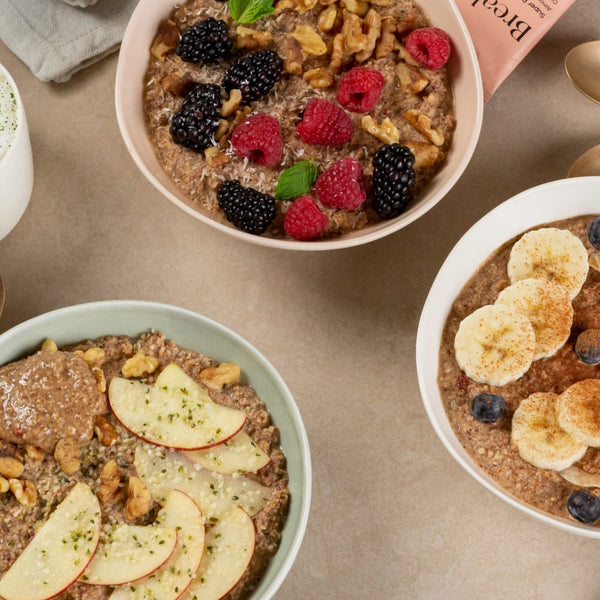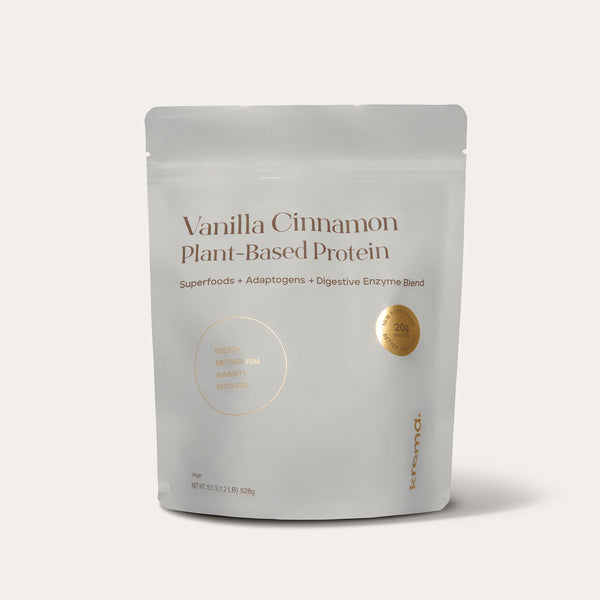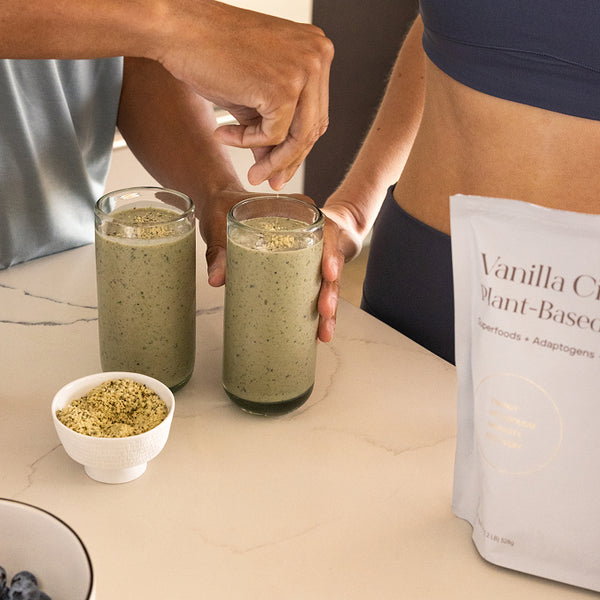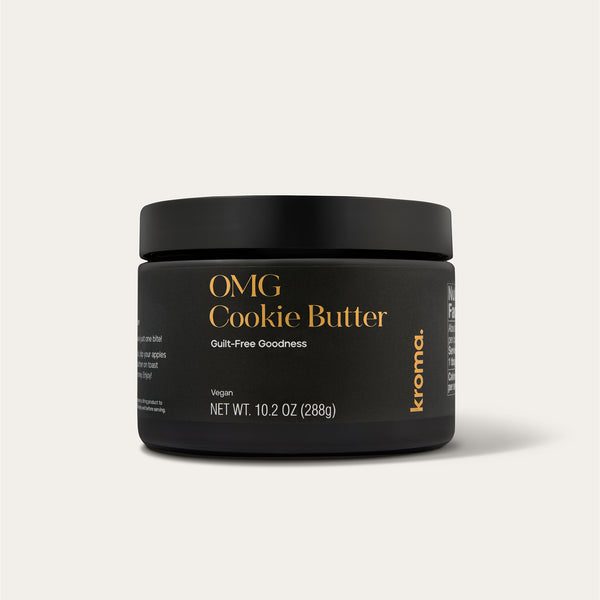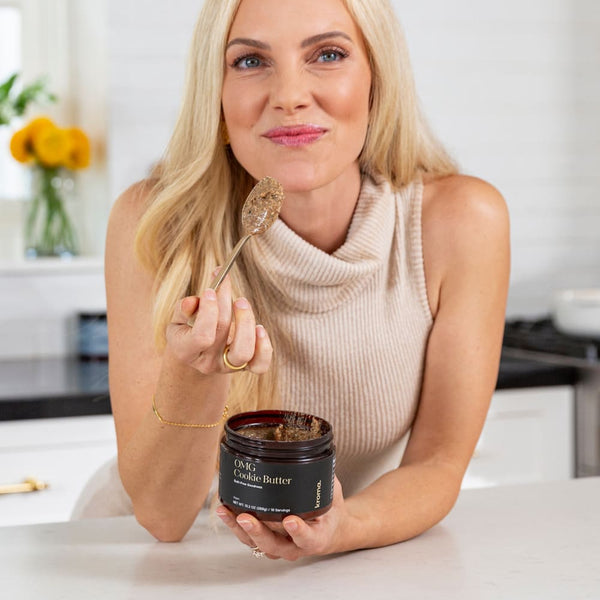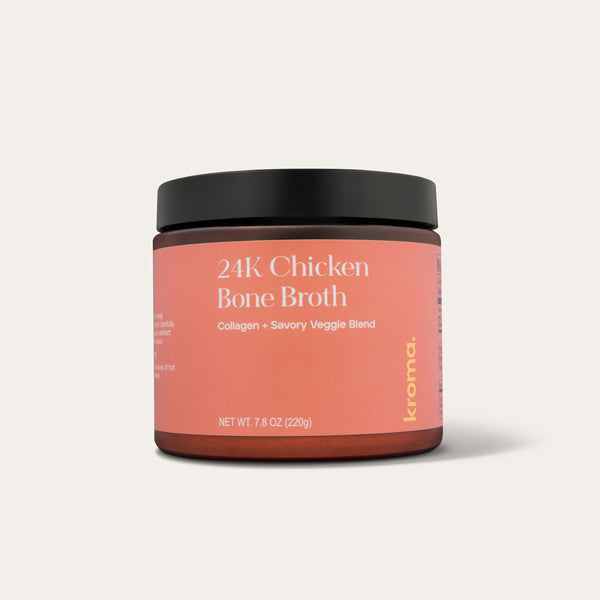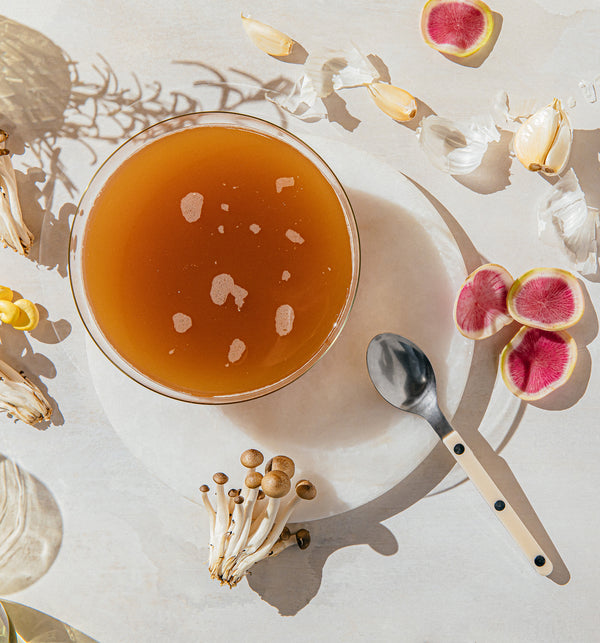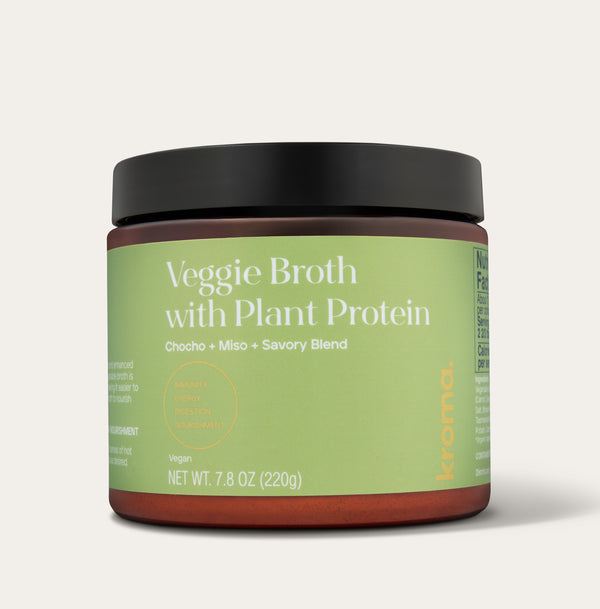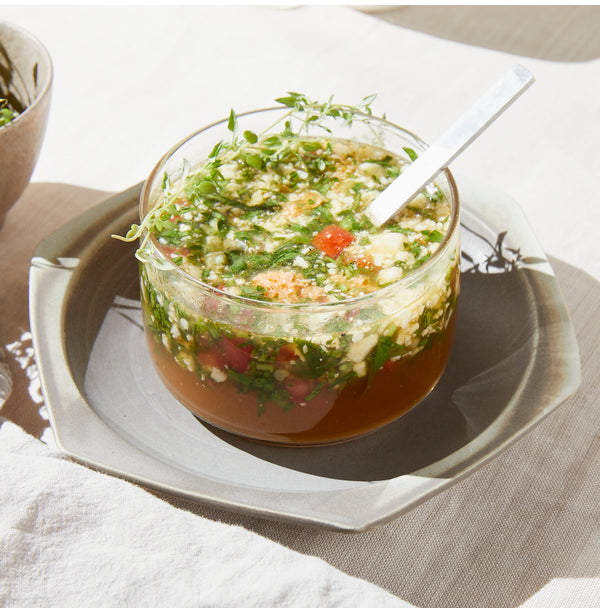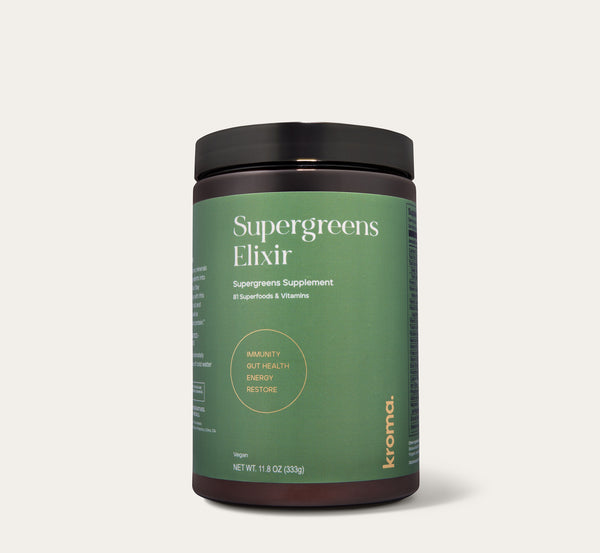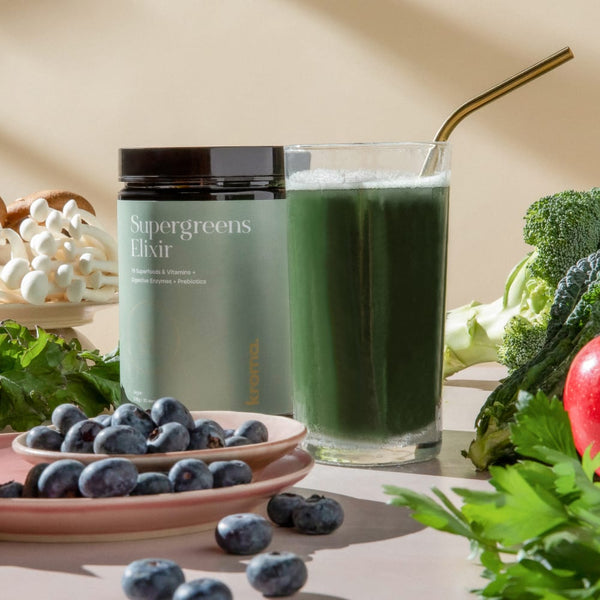By Christa Orecchio, clinical nutritionist, Kroma advisor + founder of The Whole Journey
As with pretty much everything we’ve learned in life, sugar is all about balance — more specifically, balancing your blood sugar levels. Easier said than done, especially when there are so many sneaky sources of sugar in our lives, from certain fruits to sweet cocktails. But by learning more about how important blood sugar balance is in your body, you can optimize your intake and make smarter choices through the food you eat every day.
Did you know that having steady blood sugar levels is the one thing that every person who lives over 100 has in common? Research shows that the best foods for being at a healthy weight (and living a long life) are those that don't cause a sharp rise in blood sugar levels. Balanced blood sugar is associated with physical and emotional health, as well as, and of course, longevity. If you are having problems losing weight, feeling moody, or craving caffeine, you may have a problem balancing your blood sugar. Fortunately, not all blood sugar imbalances require drug treatments, and by taking control of your sugar consumption, you can greatly improve the way you feel.
Blood sugar refers to glucose carried in the bloodstream. Glucose is the immediate source of energy for all of the body's cells. The levels of glucose in the blood are monitored by the pancreas and are tightly regulated by several hormones. The body has the ability to store glucose in the form of glycogen in the muscles and the liver. When sugar or refined carbs are digested, they are initially absorbed in the small intestine. However, they do not enter the blood circulation directly and have to go to the liver first. Under hormone control, the liver will release an appropriate amount of sugar into the bloodstream to make it available to other cells, especially the brain. These hormones include insulin, glucagon (secreted by the pancreas), cortisol, and catecholamines (secreted by the adrenal cortex and medulla). Insulin lowers the blood sugar while the cortisol and catecholamines increase it.
Today, over a third of the calories we consume come from sugar or white flour, which is highly refined and acts just like sugar in our system. When these foods are consumed, your blood sugar spikes, creating alarms to sound in your bloodstream and forces the release of insulin into the blood to turn the blood sugar into energy. Once turned into energy, your blood sugar should start to return back into the acceptable range. When a soda or a piece of candy is consumed, our bodies struggle physiologically to cope with the enormous potency of sugar. The human body doesn't have the ability to adapt to the massive quantities of sugar we consume.
The body's natural response to deal with the sugar overload is to release insulin into the bloodstream to uptake the sugar molecules. However, the body doesn't always know when to stop releasing insulin, which can then create low blood sugar, and that is what we call “the crash”. When the body's blood sugar is low, moodiness, irritability, and cravings come into play making you eat more sugar, and thus promoting a vicious cycle. What is news to some people is that the simple and refined sugars aren't the only culprit. Simple and refined carbohydrates such as white rice, pasta, and potatoes are also broken down into simple sugar molecules once they hit the small intestine, creating a similar response in the body.
For some people, the process of insulin changing blood sugar into energy doesn’t work efficiently. This can lead to health issues, including insulin resistance or even diabetes. Other symptoms of insulin resistance include: cravings for sugar, intense hunger, weakness, poor concentration, emotional instability, memory loss, lack of focus, feelings of anxiety or panic, lack of motivation, and fatigue. High insulin also damages your arteries and puts you at a greater risk of developing heart disease and stroke, type 2 diabetes, gout, polycystic ovary syndrome, and high blood pressure. Too much insulin will also result in excess unutilized blood sugars being stored as fat. For many years we have been taught to stay away from fat and eat ‘low fat and/or no fat' foods. However, we now know that in many cases fat is not the problem. Sugar is.
It's important to remember that not all carbs are evil, though. There are two types of carbohydrates – complex and simple carbohydrates. Both give you energy. However, complex carbohydrates are full of fiber and break down more slowly in your body which balances out your energy levels and leaves you feeling satisfied longer. The brain operates with glucose, so it's important to have some readily available for energy and ATP (adenosine triphosphate) conversion.
What to Eat to Maintain a Healthy Blood Sugar Level
Nutrition is key to a healthy body. Fruits, vegetables, lean protein, and healthy fats are important when prioritizing your health and longevity through nutrition. Many blue zones focus on diets low in animal proteins and high in plant-based foods, like the pescatarian, Mediterranean, and vegetarian diets.
While you don't have to stand behind one specific diet, there are areas you may want to focus on to age gracefully and have longevity. Here are some ways to support your overall health to promote a long and healthy life.
1. Focus on eating complex carbohydrates

Such as brown rice, quinoa, and other whole grains, beans and legumes, and root vegetables like sweet potatoes and butternut squash.
2. Eat your breakfast
By eating protein within one hour of waking, amino acids are provided which can be used as an alternative fuel for the body. When eaten with carbohydrates, it will slow down the release of glucose into the system. Kroma recommends intermittent fasting for at least 12 hours during its 5-Day Reset.
3. Eat plenty of fiber

Such as legumes, beans, flax seeds, chia seeds, oats, hemp seeds, nuts and seeds. Fiber will keep you full longer and help you crave less sugar. Try Kroma’s Super Porridge, which is packed with nuts, seeds and delicious superfoods rich in antioxidants to fuel your body with healthy fats and fiber.
4. Reduce mental and emotional stressors
Long-term stress may result in adrenal fatigue, which affects blood sugar.
5. Choose low glycemic foods
They release glucose at a slower rate because they take longer to break down in the intestine. Examples include sweet potatoes, green apples, berries of any kind, beans and oats.
6. Increase antioxidants

Such as raw cacao, açai berry (a key ingredient in Kroma’s Blueberry Açai Smoothie), blueberries, prunes, pomegranates, kale, brussels sprouts, beets, and red bell peppers.
7. Increase essential fatty acids
Such as cold water fish, nuts, seeds, and hemp seeds.
8. Eat cinnamon

Traditional Chinese and Ayurvedic health systems have used cassia (cinnamon) to reduce fasting blood sugar levels. Real cinnamon contains polyphenols that help maintain insulin sensitivity. Kroma uses the spice in many of its formulations, including the Vanilla Protein Smoothie.
What to Reduce or Avoid to Balance Your Blood Sugar Level:
- Concentrated sweets such as soda, candy, cakes, cookies, etc.
- Too much fruit eaten alone or fruit juice
- Gluten-containing grains which may cause undesirable responses and can continue to promote blood sugar imbalances
- Alcohol and caffeine
Foods That Are Helpful for Stabilizing Blood Sugar

Almonds – A study published in the International Journal of Obesity shows that people eating a diet rich in almonds lost more weight than those on a high-carb diet with the same number of calories. This goes to show that weight loss is not as simple as calories in vs. calories out. Almonds are bulky and filling, so you feel that you are getting some substance without the spike in blood sugar. That’s why Kroma uses raw almond butter in its OMG Cookie Butter.
Quinoa. Although quinoa looks like a grain, it's actually the seed of a green leafy plant. It is one of the best sources of amino acids and is a good source of iron, potassium, and B vitamins. The reason why quinoa is an incredible superfood for weight loss is that it's packed with protein, but its grain-like texture makes it a fantastic substitute for rice, couscous, and other carbohydrates.
Millet is rich in both fiber and protein and keeps your blood sugar even. Studies have shown a link between millet and weight loss.
Hummus is packed with protein and fills you up without spiking blood sugar. Try to get hummus with olive oil rather than sunflower oil. Or better yet, make your own hummus.
Avocados offer a range of nutrients and help you absorb other nutrients more effectively. They are also creamy and bulky at the same time, so they help people feel satisfied.
Lentils are nutritious, flavorful, and are easy to prepare. Lentils, like beans, are a good source of protein. They also provide calcium and phosphorus, vitamin B, and iron.
Walnuts are a great snack food that will fill you up and help you to feel less hungry. They contain anti-inflammatory omega-3 fats, which makes them a powerful way to balance blood sugar.
*This article originally appeared on Christa Orecchio’s site The Whole Journey







